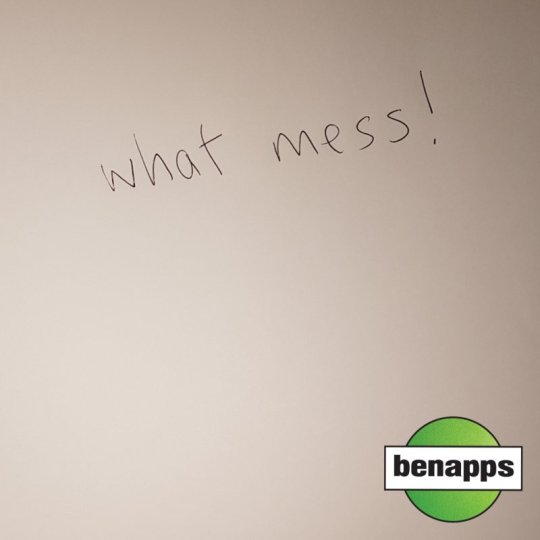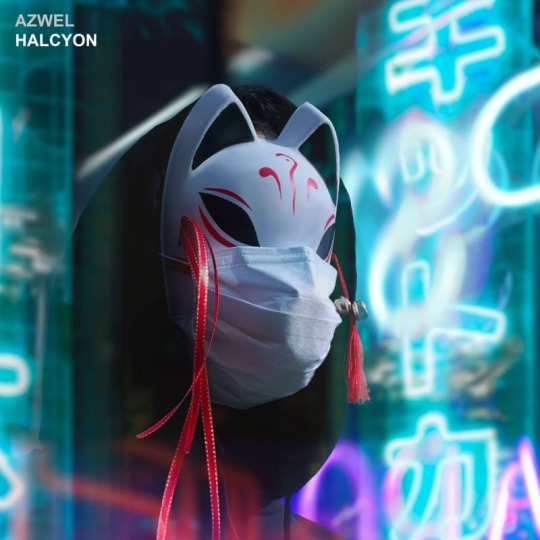The spaceman says, everybody look down.

Despite being based in Cannock, a corner of the UK with more than its fair share of paranormal legends, new Marquis Drive single Spaceman speaks more to the dreams and aspirations of the human species than the extraterrestrial.
Signed to Alan McGee’s label and supporting The Happy Mondays at the Creation Festival next year, the band have some pretty strong britpop credentials. The chuggy chorus of Spaceman certainly fits this bill, but in it’s best moments the verses have a melodic hook that’s strangely reminiscent of Aztec Camera.
Accompanied by possibly the only music video to feature an astronaut being given the wanker sign in suburban England, the band had this to say about it in a recent RGM premier:
“The video was shot in downtown Hednesford, although it could be any British town. With a grown man walking round in a spaceman outfit you’d expect a few raise eyebrows, and shock a few we did. But, in this strangest of years, some people thought it looked perfectly normal- you could hear them think "it’s prob summat to do with COVID.”
ARTIST: Marquis Drive
TITLE: Spaceman
MOOD: Lying in the gutter, staring at the stars
Sunday Sounds.
My favorite releases from the week ending 15/11/2020
Holiday Sidewinder – Red Right Hand
Hot Chip, Jarvis Cocker – Straight To The Morning
Pale Waves – Change
Lauren Aquilina – Latest Ghost
Badge Époque Ensemble, Jennifer Castle – Just Space for Light
Woodkid – Goliath
Oscar Scheller – Half Eaten
Jhana Boy – My Girl
Teenage Fanclub – Home
Haiku Hands – Suck My Cherry
Follow the playlist on Spotify
A Delightful Mess.

Described as ‘the long feared debut album from Ben Apps’ there is thankfully little to be afraid of here if you are a fan of upbeat, witty and endearingly nerdy britpop-tinged indie.
Lyrically the album is a a rollercoaster of subjects covering everything from technology, politics, media and plenty of good old fashioned romance.
Acronym laden opener T.T.F.N feels Beatlesy, if the Beatles ever wrote a song that used the expression LOL and mentioned Tick Tock, whilst delicate closer End Of The Line and standout track We’re All Going To Hell bring to mind the slower spacey moments of Blur’s Parklife. Jaunty piano number Feel It is the kind of radio-friendly earworm that with any justice should be a breakout single.
A fun, thoughtful and humorous collection of songs that should appeal to fans of bands like They Might Be Giants, Eels and Gorky’s Zygotic Mynci.
ARTIST: Ben Apps
TITLE: What Mess!
TOP TRACKS: We’re All Going To Hell, Feel It, Parallels
MOOD: Britbops
Brooding and Blissful.

Halcyon is an aptly named album bringing as it does a much needed breath of carefree optimism and melodic dreamyness to the chillier end of 2020.
Much in the vein of McCartney-penned Beatles there is a playfulness to a lot of the tracks, nowhere more evident than in the midi-outro of Get Your Game On, but there is also a deep seam of sadness and melancholia. Stand-out tracks Unanswered Questions and Live For The Dead bring a pleasing shot of drama and an eerie prettiness to the second half of the album lifting it both musically and emotionally.
A slick mixture of indie, folk and alternative guitar-pop, this is an album which should appeal to anyone who thinks they want to listen to something easy going and upbeat but, deep down, doesn’t really.
ARTIST: Azwel
TITLE: Halcyon
TOP TRACKS: Unanswered Questions, Live For The Dead, Only Time Will Tell
MOOD: Summertime Sadness
Things go better with a little bit of Razzmatazz.

I Don’t Know How But They Found Me (or iDKHOW as it’s stylised) are exactly the kind of band who will annoy almost as many people as they will be adored by, and Razzmatazz is exactly the kind of album you would expect a band like that to make.
As the title might suggest this much anticipated debut is a flamboyant and retro-tinged concoction. In their more comparatively contemporary moments there is a little of The Killers, Electric Six and twenty one pilots to be heard. Addictive earworm New Invention has shades of Gary Numan whilst From The Gallows unexpectedly channels crooner-mode Marc Bolan via ELO with a dash of Radiohead’s Fitter, Happier. Several tracks such as Clusterhug and Sugar Pills just go full out glam. The title song is, ironically, one of the less bombastic tracks on the album and offers an efficiently straightforward indie-pop banger guaranteed to take up permanent residence in your brain for hours after listening to it.
From the funky Fame-esque bassline strut of opener Leave Me Alone to charmingly unexpected piano ballad Nobody Likes The Opening Band, a paean to the plight of the overlooked support act that wouldn’t sound entirely out of place on A Night At The Opera, this is a band who are not afraid to wear their influences on their sleeve but crucially manage to meld them together into something new, exciting and uniquely theirs.
A thoroughly enjoyable album that should appeal to anyone who likes their electro-indie-pop strutting effusively just on the right side of annoying.
ARTIST: I Don’t Know How But They Found Me
TITLE: Razzmatazz
TOP TRACKS: Leave Me Alone, Nobody Likes The Opening Band, Razzmatazz, Sugarpills
MOOD: Glitzy and glitchy

Welcome to the new starting line.

Poppy’s evolution from uncanny valley arthouse fembot to industrial metal angst machine reads more like a Black Mirror pitch than your standard celebrity gossip. Following her split from partner and puppet master Titanic Sinclair the inference is that this is now the ‘real’ Poppy. The raw, angry poppy. The Poppy that won’t take that shit anymore. How much this is the case and how much this is another alter ego in the Poppy funhouse hall of mirrors is anyone’s guess, but it’s certainly a stark departure from the bubblegum, satire drenched electro-pop she made her name with.
Musically this album might not be quite ‘post-genre’ as it claims but it’s certainly a crazy riot of sub-genres encompassing everything from deathcore to drum and bass and stompy goth. On the whole it works but it does feel at times like someone trying on a few different outfits to see which one they like best then deciding just to wear them all at once. Individually the tracks are exhilarating but as a whole it can become a little exhausting. There is a playfulness about the rebelliousness of it all, lyrically, sonically and visually, but there is definitely a sense that we are meant to take it seriously too and I think it’s saved ultimately by being neither too ironic or too self important.
More than anything this feels like a stepping stone, albeit a mostly successful one, and It will be interesting to see where she will go from here – will she commit to this riotous sound or will there be a whole new Poppy around the corner for us next time?
ARTIST: Poppy
TITLE: I Disagree
MOOD: Some girls just want to watch the world burn
STANDOUT TRACKS: I Disagree, Boodmoney, Fill the Crown, Bite Your Teeth
Veda Rays.
New York post-punk band Veda Rays have released a new video for their single “Close Range,” taken from their current album For the Rest to Rest. The video has a dark and politically troubling feel that is described by band member Jim Stark as being about “image and identity, specifically as presented through the lens of the media, whether self-curated through one’s own social media platforms, or by professional design, channeled through larger outlets.”
ARTIST: Veda Rays
TITLE: Close Range
MOOD: Dystopian
Nouveau
Fantastic, stylish and super cool new track ‘Nouveau’ released today by Mark Fernyhough and Steven Horry accompanied by an equally cool and colourful video featuring an awesome gang of Berlin roller girls.
ARTIST: Mark Fernyhough & Steven Horry
TITLE: Nouveau
INTRODUCING: TOOTHPASTE

Debut Single ‘TV Years’ out 10/08
Having already made their mark on the London indie scene in an impressive collection of other musical projects, Toothpaste comprise of Amol (Vox/Guitar), Daisy (Bass), Poppy (Keys) and Sami (Drums) and promise to bring you ‘minty fresh pop bangers, wicked tunes and okayish oral hygiene.’*
Their first single ‘TV Years’ is set for release later this month on the 10th of August and they will be throwing a launch show, with the help of Viral Nights, at The Lock Tavern in London that night.
The song explores the sense of disconnect between people in the modern world – singer Amol describes it as:
“the sort of feeling that makes you want to stay away from the outside world, at home watching TV.”
‘TV Years’ is a great introduction to what promises to be an exciting new band – awash with dreamy guitars, swirling digital synths, and drifting vocals.
Please keep your eye out (and mouth open) for Toothpaste who are most definitely One To Watch.
Listen to TV Years here now! >
Find out more here:
*none of the band are qualified to give legitimate advice on oral health.
5.4 Pitchfork, 1995–present

What did we do to deserve Pitchfork?
Fantastic article on the history of Pitchfork and the recent music industry in general. Here are a couple of excerpts but please read the whole piece..
..as indie bands watched the industry’s collapse, the envy and contempt they had traditionally felt toward major labels stopped making sense. What was there to envy anymore? Wasn’t it obvious that indie bands, with their devoted networks of fans, critics, and performance venues, had it better? Not only were the major labels soul-sucking money machines, they couldn’t even make you rich! This made early indie’s militancy and paranoia look silly, and the hard lines began to soften.
In the last thirty years, no artistic form has made cultural capital so central to its identity, and no musical genre has better understood how cultural capital works. Disdaining the reserves of actual capital that were available to them through the major labels, indie musicians sought a competitive advantage in acquiring cultural capital instead. As indie’s successes began following one another in increasingly rapid succession, musicians working in other genres began to take notice. Hip-hop is an illustrative foil. As indie bands in the ’90s did everything they could to avoid the appearance of selling out, rappers tried to get as rich as possible. The really successful ones stopped rapping—or at least outsourced the work of writing lyrics—and opened clothing lines and record labels. But for all their corporate success, rappers knew where the real cultural capital lay. When Jay-Z decided, as an obscenely wealthy entertainment mogul, that he wanted finally to leave his drug-dealer persona behind, he got himself seen at a Grizzly Bear concert in Williamsburg.
Pitchfork has fully absorbed and adopted indie rock’s ideas about the uses of cultural capital, and the results have been disastrous. Indie rock is based on the premise that it’s possible to disdain commercial popularity while continuing to make rock and roll, the last half century’s most popular kind of commercial music. Sustaining this premise has almost always involved suppressing or avoiding certain kinds of knowledge. For indie bands, this meant talking circles around the fact that eventual success was not actually improbable or surprising. For indie rock’s critics, it meant refusing to acknowledge that writing criticism is an exercise in power.
This is a kind of music, in other words, that’s very good at avoiding uncomfortable conversations. Pitchfork has imitated, inspired, and encouraged indie rock in this respect. It has incorporated a perfect awareness of cultural capital into its basic architecture. A Pitchfork review may ignore history, aesthetics, or the basic technical aspects of tonal music, but it will almost never fail to include a detailed taxonomy of the current hype cycle and media environment. This is a small, petty way of thinking about a large art, and as indie bands have both absorbed and refined the culture’s obsession with who is over- and underhyped, their musical ambitions have been winnowed down to almost nothing at all.
It’s usually a waste of time to close-read rock lyrics; a lot of great rock musicians just aren’t that good with words. What you can do with a rock lyric, though, is note the kinds of phrasing that come to mind when a musician is trying to fill a particular rhythmic space with words. You can see what kind of language comes naturally, and some of the habits and beliefs that the language reveals. This makes it worth pausing, just for a moment, over Animal Collective’s most famous lyric: “I don’t mean to seem like I care about material things.” The ethical lyric to sing would be, “I don’t want to be someone who cares about material things,” but in indie rock today the worst thing would be just to seem like a materialistic person. You can learn a lot about indie rock, its fans, and Pitchfork from the words “mean to seem like.”
I sometimes have the utopian thought that in a better world, pop music criticism simply wouldn’t exist. What justification could there be for separating the criticism of popular music from the criticism of all other kinds? Nobody thinks it’s weird that theNew York Review of Books doesn’t include an insert called the New York Review of Popular Books. One of pop music criticism’s most important functions today is to perpetuate pop music’s favorite myth about itself—that it has no history, that it was born from nothing but drugs and “revolution” sometime in the middle of the 20th century. But the story of The Beatles doesn’t begin with John, Paul, George, and Ringo deplaning at JFK. It begins with Jean-Philippe Rameau’s 1722 Treatise on Harmony, which began to theorize the tonal system that still furnishes the building blocks for almost all pop music. Or, if you like, it goes back to the 16th century, when composers began to explore the idea that a song’s music could be more than just a setting for the lyrical text—that it could actually help to express the words as well. Our very recent predecessors have done many important and wonderful things with their lives, but they did not invent the musical universe all by themselves. The abolition of pop criticism as a separate genre would help pop writers to see the wider world they inhabit.